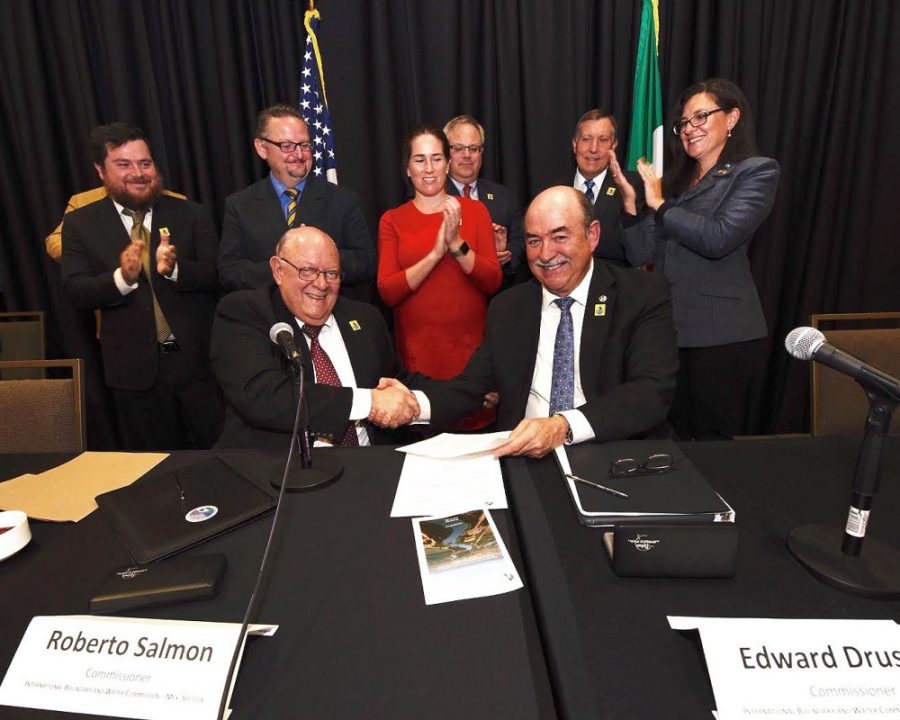Legislators from the U.S. and Mexican governments signed an agreement last week renewing commitments to share the use of and responsibilities for the Colorado River, as well as dedicating support to conservation efforts at the river’s delta.
“Extension of Cooperative Measures and Adoption of a Binational Water Scarcity Contingency Plan in the Colorado River Basin” is the official name of the international water-sharing deal signed last Wednesday, Sept. 27. Minute 323, as it’s been more informally dubbed, is an extension of the Minute 319 deal put in place in 2012.
These agreements commit the U.S. and Mexico to facing water scarcity issues on the Colorado River together through 2026. In addition, they allow for the restoration of the Colorado River Delta that empties into Mexico’s Gulf of California.
“Minute 323 is an enormous step forward for the United States and Mexico in creating reliability in the water supply for all Colorado River water users,” said Jennifer Pitt, Colorado River Project director for the National Audubon Society and key negotiator for Minute 323.
“Through negotiations, there was a strong interest from all parties in extending the kind of work that was accomplished under Minute 319,” Pitt said.
This differs from the political climate Pitt experienced when negotiations began in 2007.
“At that time, the U.S. and Mexico were really at odds over action being taken in the United States, relining the All-American Canal,” Pitt said.
RELATED: U.S., Mexico nearing deal on Colorado river water allocation
The relining had affected the flow of groundwater to Mexico — an issue that wasn’t included in the 1944 Water Treaty between the two countries.
“To get to the signing of Minute 319, there was an incredible amount of effort by many people and agencies from the federal level, the state level and NGO’s [Non-Governmental Organization] to build a relationship, build trust, build a common understanding of how the Colorado River works in both countries, so that we can find areas where the two countries could cooperate,” Pitt said.
The Colorado River Delta was once left dry by the damming at Lake Powell and Lake Mead decades ago, however conservationists began working on the delta in the early 90s. In 2014, Minute 319 allowed for a pulse flow of water to be delivered to the river in Arizona and bring the Colorado into the Gulf of California for the first time in years.
Since 2012, a coalition of six NGO conservation groups from both the U.S. and Mexico, under the name Raise the River, have taken on the responsibility of the delta’s restoration on the ground and through legislation.
“Together, we work on habitat restoration in the Colorado River Delta,” Pitt said. “We don’t all do everything, but together, cooperating, we do an awful lot.”
The University of Arizona and the Sonoran Institute are key partners in the restoration effort, according to Pitt.
RELATED: Arizona Insect Festival generates buzz around pollinators
Karl Flessa, professor of geosciences at the UA, is a researcher at the Colorado River Delta.
“It’s great to see that Mexico and the U.S. can collaborate on the management of the Colorado River, despite the continued drought, despite the prospect for a hotter climate and despite the political tensions between the two countries,” Flessa said. “It’s a great deal for both countries – and for the restoration of important habitats in the delta.”
The Sonoran Institute is a conservation organization based in Tucson. It manages the largest portion of land included in the restoration efforts. Karen Schlatter, adaptive management specialist for the Colorado River Delta program for the Sonoran Institute, called the signing of Minute 323 a “significant achievement for ensuring a more water-secure future for the West,” which is a long-term objective of the Sonoran Institute.
“We are very excited for the environmental component of the agreement, which will expand the scope of restoration in the Colorado River Delta and continue to build upon the success of restoration efforts under Minute 319,” Schlatter said.
While the signing of Minute 323 was a huge achievement for international partnership and conservation efforts, it only marks the beginning of a renewed cooperative effort.
“I’ve been joking with everybody who’s been congratulating me that I just signed them up for nine years of hard labor,” Pitt said.
She, along with partners in the U.S. and Mexico, will begin to plan how to operationalize commitments made in the agreement, while the organizations that make up Raise the River will begin a new phase in the restoration of the delta.
“We can’t wait to get to work,” Pitt said.
Follow Chandler Donald on Twitter









